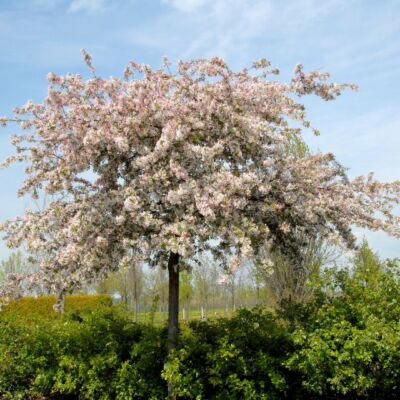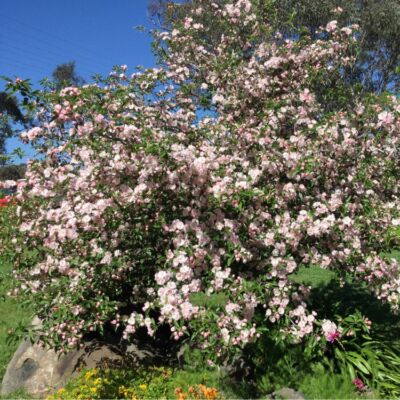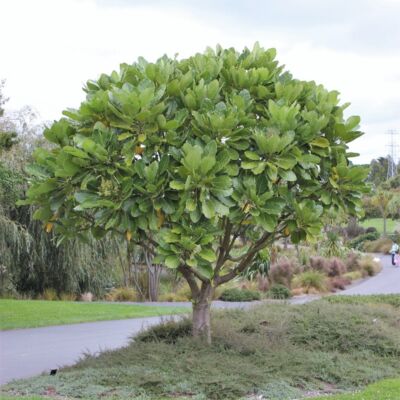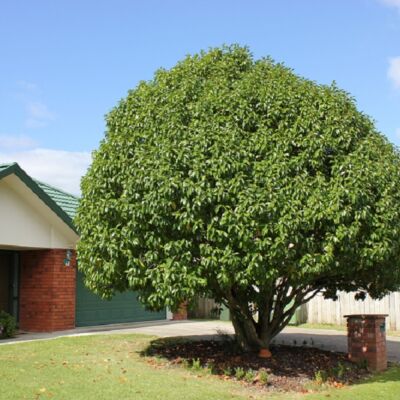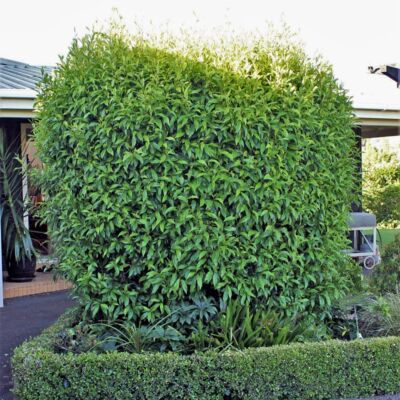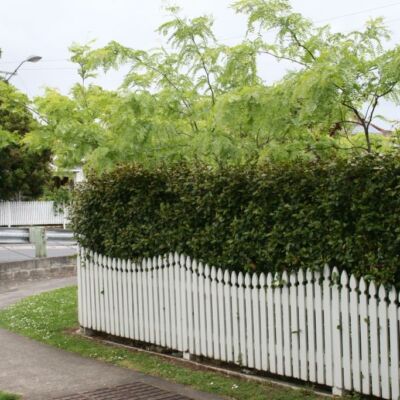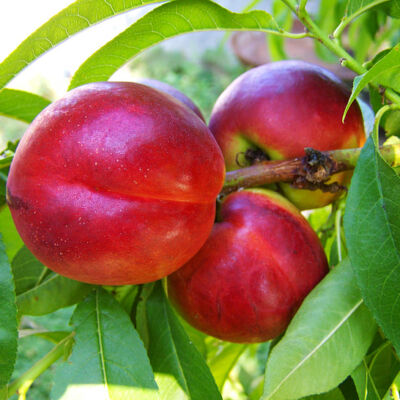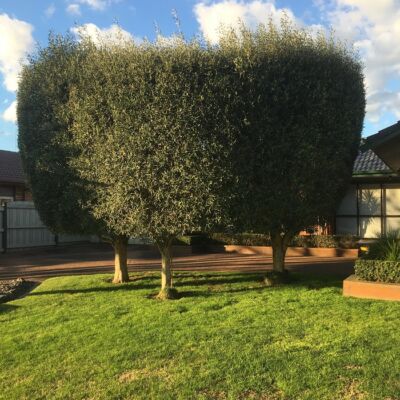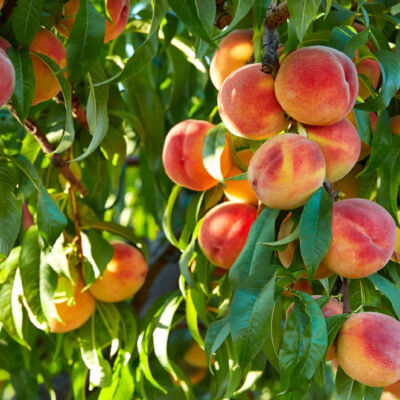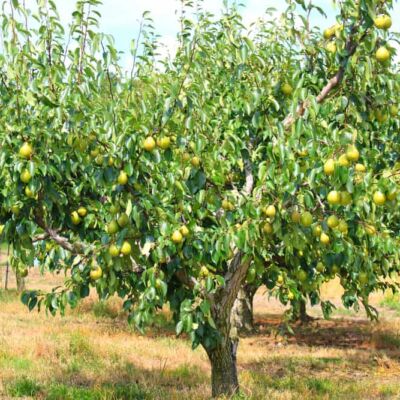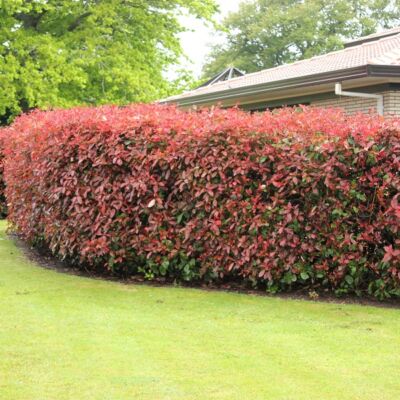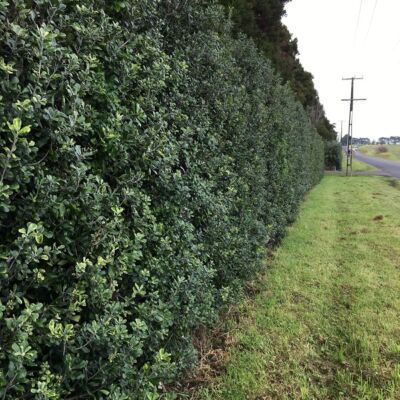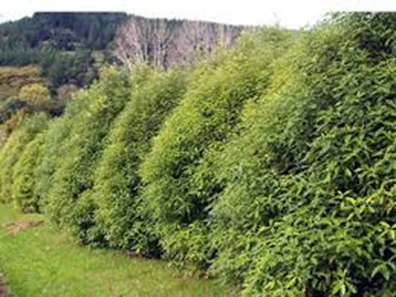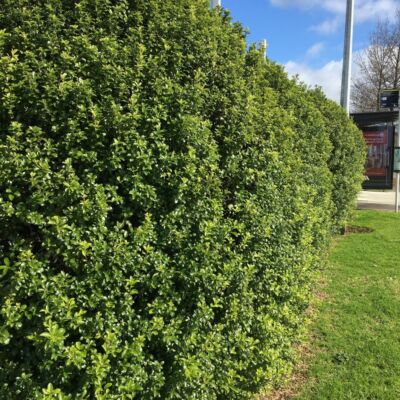|
A smaller growing, ornamental tree with long gracefully arching branches. In spring the whole tree becomes covered with bright pink buds opening to white to pale pink flowers. Yellow fruits flushed red soon follow which can be eaten but birds also enjoy. |
| Height x Width | 3 x 2.5m |
| Height Range | Small 1-5m |
| Growth Rate | Moderate |
| Plant Type | Tree |
| Shape / Habit | Conical |
| Country of Origin | Japan |
| Similar to Consider | Other Crab apples, Cercis Forest Pansy, Prunus Flowering Cherries |
|
|
| Leaf Colour | Green |
| Deciduous Leaf Colour | Yellow |
|
|
| Flower Colour | Pinks and Reds |
| Fragrant? | No |
|
|
| Accent | Yes |
| Bird Feeding | Yes |
| Fruit Producing | Yes |
| Note: Growth, height and grade information are given in good faith but are subject to natural variables beyond our control. | |
-
-
- Description
A smaller vase shaped tree with bright green leaves. Very large, fragrant soft pink double flowers in spring. Leaves turn orange-red in autumn. Very limited numbers yellow-green fruit which are not edible. Its all about the flowers! Height x Width 4 x 2 Height Range Small Growth Rate Medium Plant Type Tree Shape / Habit Round Country of Origin United States Similar to Consider Other Crabapples, Prunus awanui - Leaf
Leaf Colour Green Deciduous Leaf Colour Orange and Red - Flower
Flower Colour Soft Pink Fragrant? Yes - Uses
Specimen Yes Accent Yes Note: Growth, height and grade information are given in good faith but are subject to natural variables beyond our control. -
The Mandarin is a small evergreen citrus TREE with shiny, green, and rather small LEAVES. Over summer FLOWERS appear which are heavily perfumed. FRUIT start to ripen over winter which are small and orange and have a robust sweet taste. Skin is normally thin. Mandarins usually flourish in the smaller garden but can also be grown in a container on a sunny balcony or deck. FEED your mandarin tree in spring and summer to encourage maximum fruiting and flowering. They normally smother themselves in fruit and is therefore well worth growing. Citrus are usually self-fertile. HARVEST May to September. Make enquiries as to which varieties we have available now or see our online catalogue.
-
- Description
A smaller growing tree with smaller bright orange fruit. Classic mandarin flavour, which is robust, and sweet. Normally seedless but can produce pips if cross pollinated with other pipped citrus. HARVEST – JUN-AUG Height x Width 2 x 1.5 Height Range Small 1-5m Growth Rate Moderate Plant Type Tree Shape / Habit Round Country of Origin Algeria, Northern Africa Similar to Consider Orange, Tangelo, Satsuma mandarin, - Leaf
Leaf Colour Dark Green - Flower
Flower Colour White Fragrant? Yes - Uses
Fruit Producing Yes Note: Growth, height and grade information are given in good faith but are subject to natural variables beyond our control. -
A small, slow growing, hardy TREE with an open, almost weeping habit of growth with shiny, green, rather small LEAVES.. Fragrant white FLOWERS are followed by orange winter FRUIT that can be picked as soon as they colour. They are quite flat in shape with a thick, loose, very easily peeled skin. The flesh is light orange, juicy, seedless (unless cross-pollinated by neighbouring seedy citrus) with a sweet mild flavour. FEED your mandarin tree in spring and summer to encourage maximum fruiting and flowering. They normally smother themselves in fruit and is therefore well worth growing. Citrus are usually self-fertile. HARVEST May to September. APX 2.5 - 3.0m tall. Make enquiries as to which varieties we have available now or see our online catalogue.
-
- Description
A smaller growing tree with huge handsome deep green shining leaves up to 50cm long and 20cm wide. Grows in average soil. Great for coastal gardens as it is both wind and salt tolerant. Good tropical filler in the back of a garden. Height x Width 5 x 3 Height Range Small 1-5m Growth Rate Moderate Plant Type Tree Shape Round Country of Origin New Zealand Similar to Consider Griselinia Lucida, Pseudopanax laetus - Leaf
Leaf Colour Green - Flower
Flower Colour Insignificant - Uses
Accent Yes Note: Growth, height and grade information are given in good faith but are subject to natural variables beyond our control. -
- Description
Selected smaller growing compact bushy habit with smaller leaves compared to other Pohutukawa. Early flowering-bright orange/red flowers. Will tolerate very tough conditions including salt-laden wind, poor soil, dry and full sun. Excellent for smaller gardens and can easily be trimmed. Height x Width 4 x 2 Height Range Small 1-5m Growth Rate Moderate Plant Type Tree Shape Round Country of Origin New Zealand Similar to Consider Other Metrosideros - Leaf
Leaf Colour Green - Flower
Flower Colour Red Fragrant? No - Uses
Specimen Yes Good Shade Tree? Yes Screening / Shelter Yes Bird Feeding Yes Note: Growth, height and grade information are given in good faith but are subject to natural variables beyond our control. -
- Description
Small to medium sized tree with large leathery green leaves. Strongly scented creamy white flowers are produced in mass over a long succession during spring and summer. Grows in full sun or part shade in rich moisture retentive free-draining soil. An excellent specimen tree or shelter screen. Grows apx. 4 x 2m Height x Width 4 x 2 Height Range Small 1-5m Growth Rate Moderate Plant Type Tree Shape Round Country of Origin New Zealand Similar to Consider Michelia Mixed Up Miss, Maudiae, Doltsopa, Magnolia DD Blanchard, Magnolia Little Gem - Leaf
Leaf Colour Green - Flower
Flower Colour White Fragrant? Yes - Uses
Specimen Yes Accent Yes Screening / Shelter Yes Note: Growth, height and grade information are given in good faith but are subject to natural variables beyond our control. -
- Description
A small rounded shrub with fresh lime green foliage and small, heavily scented cream flowers streaked with purple. Sun to shade. The shrub assumes a looser more open form when grown in shade. Individuals grown in sunny situations tend to be more compact with denser foliage that is lighter and more yellow green. Prefers humus rich, well drained, slightly acidic soil. An excellent small hedge or stand alone specimen. Native to Western China. Height x Width 3 x 2.5 Range Small 1-5m Growth Rate Slow Plant Type Shrub Shape Round Country of Origin Western China Similar to Consider Syzygium resilience, Camellias, Pittosporums, Corokia, Griselinia, Ficus, Ilex largo, Olea El Greco, Eugenia Ventinatii - Leaf
Leaf Colour Green - Flower
Flower Colour Cream and Purple Fragrant? Yes - Uses
Hedging Yes Note: Growth, height and grade information are given in good faith but are subject to natural variables beyond our control. -
- Description
Grows as a small, rounded tree with olive green leaves with a brown under felt. In late winter early spring they produce small, round perfumed, cream flowers with prominent stamens which burst from furry brown buds. Protect from strong winds. Slow growing. Excellent trimmed as a hedge or makes a beautiful small growing specimen. Height x Width 4 x 3 Height Range Small 1-5m Growth Rate Moderate Plant Type Tree Shape / Habit Round Country of Origin Similar to Consider Michelia Bubbles, - Leaf
Leaf Colour Dark Green, brown under felt - Flower
Flower Colour Cream Fragrant? Yes - Uses
Specimen Yes Accent Yes Hedging Yes Bird Feeding Yes Note: Growth, height and grade information are given in good faith but are subject to natural variables beyond our control. -
- Description
Forms an attractive, fresh-looking, small upright tree. Leaves are long, smooth, thick and leathery. In spring clusters of small cream to pale pink flowers followed by Red to Purple fruits, which attract birds. Trims well. Height x Width 6 x 3 Height Range Medium 5-10m Growth Rate Moderate Plant Type Tree Shape Narrow Country of Origin New Zealand Similar to Consider Planchonella costata, Dodonea Viscosa and Purp, Alectryon excelsa, Vitex Lucens, Dysoxylum Spectabile - Leaf
Leaf Colour Green - Flower
Flower Colour Pink Fragrant? No - Uses
Bird Feeding Yes Note: Growth, height and grade information are given in good faith but are subject to natural variables beyond our control. -
A small to medium growing deciduous TREE native to North West China which are very closely related to the peach. Nectarines have arisen many times from peach trees, often as bud sports. LEAVES are green and turn shades of yellow and orange over autumn. FLOWERS in spring are generally pink. Nectarines produce sweet, juicy FRUITS that can be white or yellow, and clingstone or freestone. HARVEST is from Dec - March Make enquiries as to which varieties we have available now or see our online catalogue.
-
- Description
A compact Olive with smaller leaves giving a dense appearance. A consistent small fruiting variety with heavy crops. Has a good oil content and also used for pickling. Being from the Mediterranean olive trees require full sun and will tolerate wind coastal and can also survive extended dry periods. This variety especially good for hedging as it trims well into a dense hedge. Height x Width 4 x 2 Range Small 1-5m Growth Rate Moderate Plant Type Tree Shape Conical Country of Origin Greece Similar to Consider Syzygium resilience, Michelia Figo, Camellias, Pittosporums, Corokia, Griselinia, Ficus, Ilex largo, Eugenia Ventinatii - Leaf
Leaf Colour Green - Flower
Flower Colour Cream very small Fragrant? No - Uses
Accent Yes Screening Yes Hedging Yes Bird Feeding Yes Fruit Producing Yes but small Note: Growth, height and grade information are given in good faith but are subject to natural variables beyond our control. -
Sweet oranges were mentioned in Chinese literature in 314 BC. Orange TREES are of the most cultivated fruit tree in the world. Deep green, their LEAVES can be boiled to make orange tea! White, fragrant FLOWERS over summer are very fragrant. FRUIT is produced over winter are deep orange with good, juicy, sweet flavour. Can be eaten fresh, or processed for its juice or fragrant peel. FEED your Orange tree in spring and summer to encourage maximum fruiting and flowering. HARVEST Jul - Sept. Grows to apx 4m tall. The name sinensis means "from China" in Latin Make enquiries as to which varieties we have available now or see our online catalogue.
-
Peaches are a small to medium growing deciduous TREE native to North West China. It belongs to the genus Prunus, which includes the cherry, apricot, almond, and plum, and the nectarine. LEAVES are green and turn shades of yellow and orange over autumn. FLOWERS in spring are generally pink. Peaches produce sweet, juicy FRUITS that can be white or yellow, and clingstone or freestone. Harvest: Dec - March. All varieties are self-fertile. Make enquiries as to which varieties we have available now or see our online catalogue.
-
European Pears provide some of the best fruit in the world. It is medium-sized, deciduous TREE native to coastal and mildly temperate regions of Europe, North Africa, and Asia. LEAVES long, glossy green. White FLOWERS appear in spring with HARVEST between Feb to May depending on variety. They are one of the easiest and most traditional fruits for training into espalier form. An excellent choice for the home garden. As most pears need cross pollination, the planting of more than one variety, or a double a grafted tree is recommended. HARVEST: EARLY = Feb – Mar. MID = March –April. LATE = April – May Make enquiries as to which varieties we have available now or see our online catalogue.
-
- Description
A hardy shrub or small tree with glossy, elliptic leaves to 10cm in length, bright red when young, later dark green that is valued for its bright red new growth. Clusters of small white flowers during summer will generally not appear on regularly trimmed plants. The regularly trimming will keep them to size and prevent the branches from getting too large. A yearly application of slow release fertilizer will help maintain their vigour and colour. Height x Width 5 x 3 Height Range Medium 5-10m Growth Rate Fast Plant Type Shrub Shape Round Country of Origin New Zealand Similar to Consider Eugenia Ventinatii, Syzygium Resilience - Leaf
Leaf Colour Green Red - Flower
Flower Colour White Fragrant? No - Uses
Accent Yes Screening / Shelter Yes Hedging Yes Note: Growth, height and grade information are given in good faith but are subject to natural variables beyond our control. -
- Description
Hardy coastal large shrub or small tree. Leathery dark green leaves felted underneath. Flowers dark crimson to purple. Prefers full sun in free draining soil but will also tolerate dry soil once established. Easily trims to make a very good hedge or can be allowed to grow to a hardy screen. Windy conditions and coastal exposure OK. Height x Width 6 x 4 Range Medium 5-10m Growth Rate Moderate Plant Type Tree Shape Round Country of Origin New Zealand Similar to Consider Syzygium resilience, Michelia Figo, Camellias, Corokia, Griselinia, Ficus, Ilex largo, Olea El Greco, Eugenia Ventinatii - Leaf
Leaf Colour Green - Flower
Flower Colour Purple Fragrant? No - Uses
Screening / Shelter Yes Hedging Yes Bird Feeding Yes Fruit Producing No Note: Growth, height and grade information are given in good faith but are subject to natural variables beyond our control. -
- Description
A fast-growing bushy native tree. Leaves larger than other pittosporums and has lemon scent when crushed. It has highly fragrant clusters of small attractive yellow-cream flowers in spring, followed by distinctive black seed capsules. Best in full sun. Will tolerate damp soils and moderately windy conditions. Ideal as a large screen or hedge as responds very well to trimming. Plant Type Tree Shape Pyramidical Country of Origin New Zealand Similar to Consider Other Pittosporums, Planchonella costata, Myrsine salicina - Leaf
Leaf Colour Green Lime - Flower
Flower Colour Yellow - small Fragrant? Yes - Uses
Screening / Shelter Yes Bird Feeding Yes Hedging Yes Note: Growth, height and grade information are given in good faith but are subject to natural variables beyond our control. -
- Description
Tenufolium type: Compact bushy small tree with an excellent rounded habit. Leaves lettuce green small and fresh-looking. Small purple flowers are fragrant in the stillness or morning or evening. Full sun dry tolerant once established. Trims well so ideal as a hedge planted in rows or individually as a specimen. Height x Width 3 x 3 Range Small 1-5m Growth Rate Moderate Plant Type Tree Shape Round Country of Origin New Zealand Similar to Consider Other Pittosporums - Leaf
Leaf Colour Green Lime - Flower
Flower Colour Red Purple Fragrant? No - Uses
Screening / Shelter Yes Hedging Yes Bird Feeding Yes Note: Growth, height and grade information are given in good faith but are subject to natural variables beyond our control.
